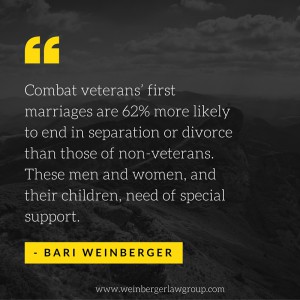Veterans, Divorce & Adjusting To Family Life After Active Service
 Although a veteran’s return from active service should be a happy time, it can also be a challenging adjustment for a family. According to a study from Brigham Young University, “combat experience is an important risk factor for divorce or separation.” The study found that combat veterans’ first marriages are 62% more likely to end in separation or divorce than those of non-veterans. The reasons behind these statistics?
Although a veteran’s return from active service should be a happy time, it can also be a challenging adjustment for a family. According to a study from Brigham Young University, “combat experience is an important risk factor for divorce or separation.” The study found that combat veterans’ first marriages are 62% more likely to end in separation or divorce than those of non-veterans. The reasons behind these statistics?
For many, it’s the traumatic experiences of active service that unfortunately contribute to an inability to sustain healthy relationships. For example, soldiers experiencing PTSD (post-traumatic stress disorder) may exhibit the following symptoms and behaviors:
– Nightmares and difficulty sleeping
– Anger outbursts
– Depression
– Hypervigilance
– Loss of interest
– Feeling numb or emotionally distant
Relationship problems
In the 2008 film The Hurt Locker, Jeremy Renner plays a sergeant whose numbness and distance keep him separate from his wife and young son. Capable of making split-second decisions deactivating bombs during the Iraq war, Renner’s character is rendered hapless in the aisle of a supermarket where he’s overwhelmed by cereal choices. At home, he struggles to find meaning and connection in small moments with his son. The film’s ending is ambiguous. We don’t know whether Renner’s marriage survives the transition from military life to normal life, or if he went on to develop some of the dysfunctional coping tools – alcohol and drug abuse, compulsive working, social isolation – that soldiers frequently use to buffer themselves from the crippling effects of PTSD.
The transition home can be challenging for partners as well, who may struggle to understand what their spouses are going through. They may take the veteran’s anger outbursts and withdrawal personally, and walk on eggshells in order not to upset him. This, in turn, can make the person who has returned from service feel even more isolated and depressed, and retreat further from his family.
Veterans and their families need to realize they’re not alone. Those finding the adjustment from active service to normal life challenging can find excellent resources at their local VA Centers. Some of these services include:
– Individual counseling
– Couples counseling
– Peer Support Groups
– EMDR (an evidence-based treatment designed to help individuals process and release trauma)
If there’s too much discord at home, even with treatment, a couple may decide to live apart while they continue to work on their problems. In this case, they need to identify a family law attorney who can help them prepare a separation agreement which will establish temporary child support and a parenting plan and suspend the division of assets.
When reconciliation isn’t possible, a couple can ask their attorney to draft a marital settlement agreement that will make their divorce final. To do this, they should expect to follow special rules that can apply to military divorce. Whether temporarily separated or divorced, a couple should support their children’s relationship with the other parent by taking the following steps:
– Present the decision to divorce as a united front
– Keep visitation drop-offs as smooth as possible by refraining from cross words and hostile body language
– Encourage the other parent’s visitation or phone calls to the children
– Never bad-mouth the other parent to the children
Not every military family can survive a soldier’s return home. But even those who choose to dismantle their family unit can work together to create a low-conflict divorce and a strong co-parenting relationship.
Going through a military divorce? Our experienced attorneys understand how to minimize the legal stress of divorce, allowing you to move forward with your life. Please contact us for your initial attorney consultation.


